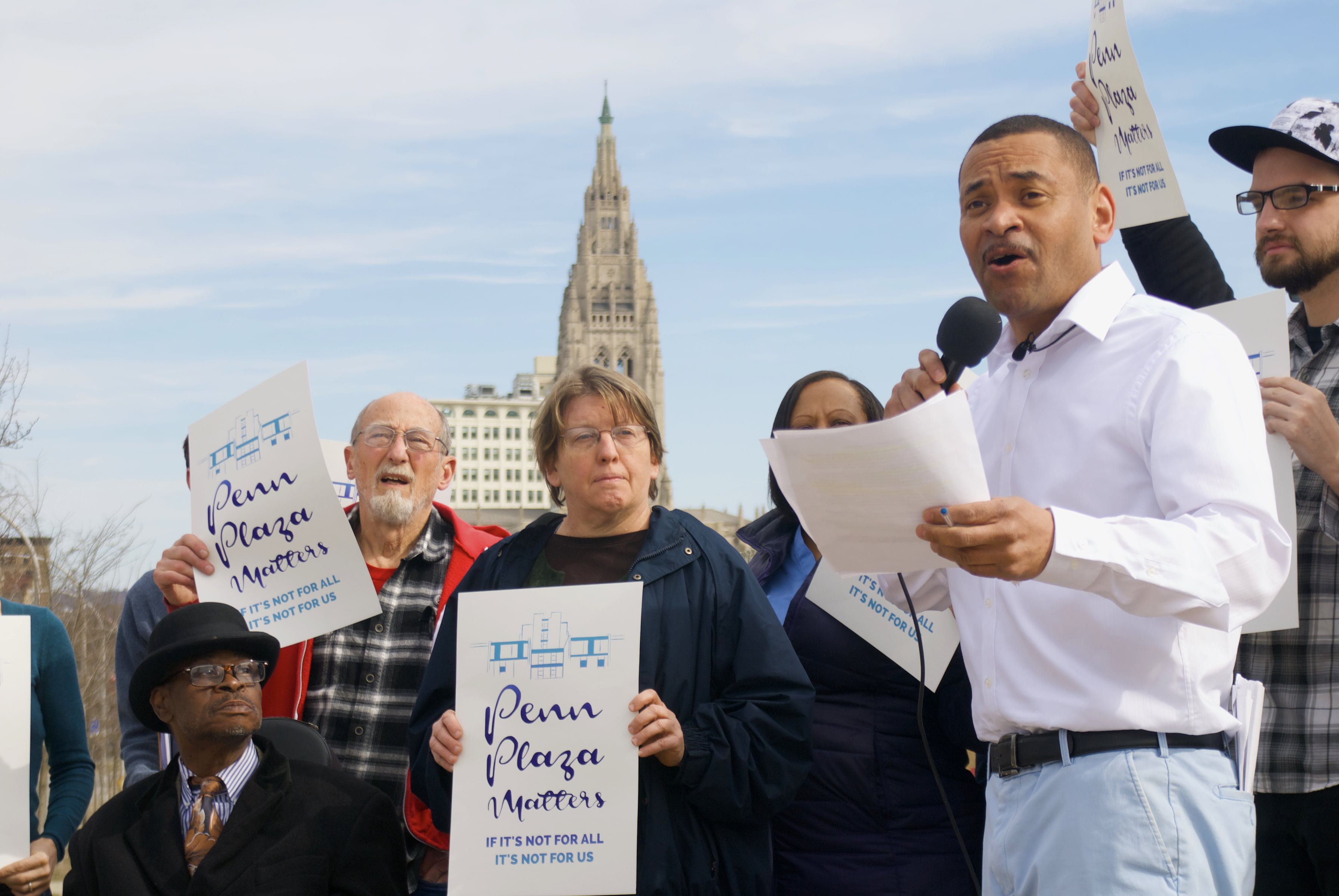Neighbors rally for East Liberty residents displaced by developers
Story by Jason Vrabel, Bulletin contributor
 ABOVE: Former Penn Plaza resident Randall Taylor (right, holding microphone) speaks to local community members at a Mar. 19 rally in East liberty. Taylor and other members of the Penn Plaza Support & Action Coalition voiced concerns about the redevelopment plans for the gateway site at Penn & Negley Aves. Photo by Jason Vrabel.
ABOVE: Former Penn Plaza resident Randall Taylor (right, holding microphone) speaks to local community members at a Mar. 19 rally in East liberty. Taylor and other members of the Penn Plaza Support & Action Coalition voiced concerns about the redevelopment plans for the gateway site at Penn & Negley Aves. Photo by Jason Vrabel.
East Liberty – More than a year after the city’s Planning Commission unanimously denied a redevelopment proposal for the former Penn Plaza apartment site, the public got its first full look at a revised plan during a public meeting at Eastminster Presbyterian Church on March 21 [Read accompanying article, “Plans for Penn Plaza debated at contentious community meeting,” on page 5 of the April 2018 Bulletin].
A 2017 Consent Order between the City, developer, and other entities officially put to rest a number of legal disputes between them, and established conditions to guide the redevelopment. But critics of the Order raise the issue that the revised plan leaves many social and economic concerns unresolved.
Pennley Park South, a subsidiary of LG Realty Advisors, the owner of the property, is the developer for the project. Envisioned in their revised proposal is a mix of high end office and retail space for the site that previously provided several hundred units of affordable housing.
According to documents furnished by the property owner, the estimated $150 million project will improve the urban realm, enhance Enright Parklet, provide a range of job opportunities, and reaffirm a “commitment to East Liberty and Fair and Affordable Housing.”
In February of 2017, a lack of community engagement was cited by the Planning Commission as a primary reason for denying the plan. The Consent Order sought to correct this, but stated that the first of two public meetings must be scheduled within ten days of a “determination of completeness” by the City’s planning department.
The meeting was announced on March 14, giving everyone less than a week to review Pennley Park South’s 84-page plan. This slim timeline actually emboldened the advocacy group, Penn Plaza Support & Action Coalition (PPSA), which encouraged its members to attend. In a written statement, PPSA deemed the rushed timetable “a violation of democratic public process.” Still, the organization managed to attract over 200 attendees to the March 21 meeting.
“LG Realty and the City have refused to engage the real community,” former Penn Plaza resident and PPSA member, Randall Taylor, said following a March 19 press conference in front of the empty Penn Plaza site. “The more you involve the community and former residents, the more opportunities you have to make sure that days like this don’t happen.”
PPSA objects to other aspects of the order, including tax incentives for high-end development in the rapidly gentrifying East Liberty neighborhood.
The site is within a Transit Revitalization Investment District (TRID) that will reduce Pennley Park South’s future tax obligations. As part of its settlement with the City, the developer agreed to use 50% of the tax break for infrastructure investments like new sidewalks & sewer lines. The remaining 50% will help fund improvements to Enright Park and the creation of a local housing fund.
According to the developer’s plan, the Urban Redevelopment Authority of Pittsburgh has estimated that “Pennley Park South’s total pledge, upon completion of all phases of the Development, will amount to approximately $6 million of direct investment towards Enright Park and the [housing fund].”
Specifically, the plan states that the funds will “provide amenities such as (a) accessible roads and sidewalks, (b) bicycle enhancements, (c) community and recreational spaces; and most significantly (d) GAP Funding for Affordable Housing.”
The Order states that no housing will be built on site, and that replacement housing will be built “within one mile” of the intersection of Penn and Negley Aves. PPSA members argue that this distance will place people too far from job opportunities, public transportation hubs, and supermarkets.
The housing fund will target those earning 60-80% of the area median income ($817-$1,090 for a one-bedroom unit), which PPSA has stated will be far out of reach for low-income renters.
As Alethea “Lee” Sims, president of the Coalition of Organized Residents and another former Penn Plaza resident, said at PPSA’s press conference, “We need housing more than office. We need housing more than stores. We need places for people to live.”
PPSA members say that the Order was “negotiated behind closed doors” and, that by not including any representation for displaced residents, it sets a “dangerous precedent” for the city.
“It is okay for you to destroy a neighborhood’s affordable housing and create plans behind the community’s back,” PPSA member Dan Yablonsky said facetiously. “In fact, we will give you huge tax breaks – as long as you promise that, down the line, you use a portion of that tax break to fund housing in a different neighborhood, at costs that displaced residents can no longer afford,” he continued. “Pittsburgh deserves more.”
The group will use the Planning Commission Hearings to illuminate other aspects of the project that they deem unacceptable. The allocation of the housing funds will be determined by a “Housing Committee,” represented by the City and four community groups. PPSA sees this as part of an ongoing exclusion of former tenants, and has demanded that the committee add representation for displaced residents.
However, Taylor said that the future elements of the plan are not his primary concern right now. “We intend to stop their plan, so that stops all of that. I think we’re going to stop this plan.”
As per the Order, “All parties shall respond to issues raised [in] the first meeting at the second meeting.” On Monday, Apr. 16, the second community meeting will begin at 6 p.m. at Eastminster Presbyterian Church (250 N. Highland Ave.); it is open to the public.


Leave A Comment